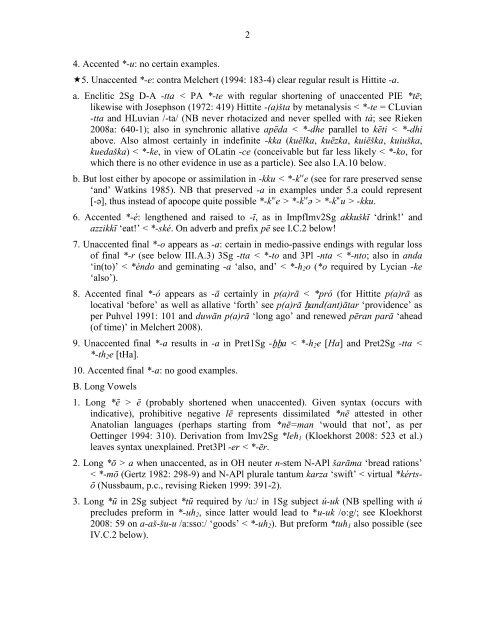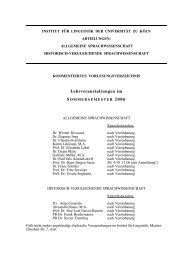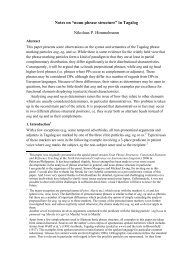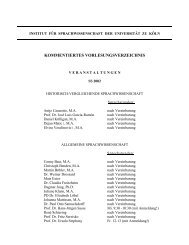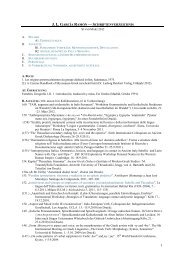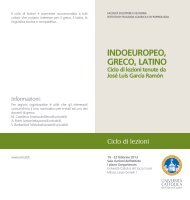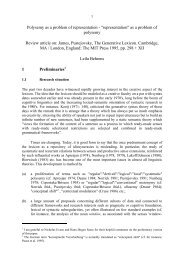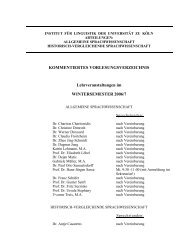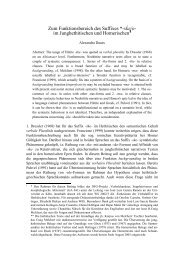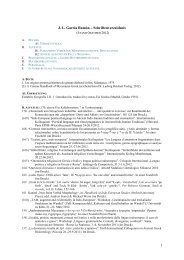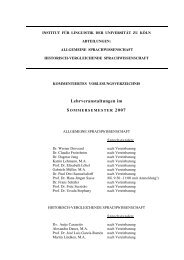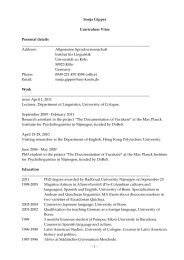Topics in Anatolian Historical Grammar Prof. Dr. H. Craig Melchert
Topics in Anatolian Historical Grammar Prof. Dr. H. Craig Melchert
Topics in Anatolian Historical Grammar Prof. Dr. H. Craig Melchert
Create successful ePaper yourself
Turn your PDF publications into a flip-book with our unique Google optimized e-Paper software.
2<br />
4. Accented *-u: no certa<strong>in</strong> examples.<br />
5. Unaccented *-e: contra <strong>Melchert</strong> (1994: 183-4) clear regular result is Hittite -a.<br />
a. Enclitic 2Sg D-A -tta < PA *-te with regular shorten<strong>in</strong>g of unaccented PIE *tē;<br />
likewise with Josephson (1972: 419) Hittite -(a)šta by metanalysis < *-te = CLuvian<br />
-tta and HLuvian /-ta/ (NB never rhotacized and never spelled with tà; see Rieken<br />
2008a: 640-1); also <strong>in</strong> synchronic allative apēda < *-dhe parallel to kēti < *-dhi<br />
above. Also almost certa<strong>in</strong>ly <strong>in</strong> <strong>in</strong>def<strong>in</strong>ite -kka (kuēlka, kuēzka, kuiēška, kuiuška,<br />
kuedaška) < *-ke, <strong>in</strong> view of OLat<strong>in</strong> -ce (conceivable but far less likely < *-ko, for<br />
which there is no other evidence <strong>in</strong> use as a particle). See also I.A.10 below.<br />
b. But lost either by apocope or assimilation <strong>in</strong> -kku < *-k w e (see for rare preserved sense<br />
‘and’ Watk<strong>in</strong>s 1985). NB that preserved -a <strong>in</strong> examples under 5.a could represent<br />
[-ə], thus <strong>in</strong>stead of apocope quite possible *-k w e > *-k w ə > *-k w u > -kku.<br />
6. Accented *-é: lengthened and raised to -ī, as <strong>in</strong> ImpfImv2Sg akkuškī ‘dr<strong>in</strong>k!’ and<br />
azzikkī ‘eat!’ < *-ské. On adverb and prefix pē see I.C.2 below!<br />
7. Unaccented f<strong>in</strong>al *-o appears as -a: certa<strong>in</strong> <strong>in</strong> medio-passive end<strong>in</strong>gs with regular loss<br />
of f<strong>in</strong>al *-r (see below III.A.3) 3Sg -tta < *-to and 3Pl -nta < *-nto; also <strong>in</strong> anda<br />
‘<strong>in</strong>(to)’ < *éndo and gem<strong>in</strong>at<strong>in</strong>g -a ‘also, and’ < *-h 2 o (*o required by Lycian -ke<br />
‘also’).<br />
8. Accented f<strong>in</strong>al *-ó appears as -ā certa<strong>in</strong>ly <strong>in</strong> p(a)rā < *pró (for Hittite p(a)rā as<br />
locatival ‘before’ as well as allative ‘forth’ see p(a)rā ḫand(ant)ātar ‘providence’ as<br />
per Puhvel 1991: 101 and duwān p(a)rā ‘long ago’ and renewed pēran parā ‘ahead<br />
(of time)’ <strong>in</strong> <strong>Melchert</strong> 2008).<br />
9. Unaccented f<strong>in</strong>al *-a results <strong>in</strong> -a <strong>in</strong> Pret1Sg -ḫḫa < *-h 2 e [Ha] and Pret2Sg -tta <<br />
*-th 2 e [tHa].<br />
10. Accented f<strong>in</strong>al *-a: no good examples.<br />
B. Long Vowels<br />
1. Long *ē > ē (probably shortened when unaccented). Given syntax (occurs with<br />
<strong>in</strong>dicative), prohibitive negative lē represents dissimilated *nē attested <strong>in</strong> other<br />
<strong>Anatolian</strong> languages (perhaps start<strong>in</strong>g from *nē=man ‘would that not’, as per<br />
Oett<strong>in</strong>ger 1994: 310). Derivation from Imv2Sg *leh 1 (Kloekhorst 2008: 523 et al.)<br />
leaves syntax unexpla<strong>in</strong>ed. Pret3Pl -er < *-ēr.<br />
2. Long *ō > a when unaccented, as <strong>in</strong> OH neuter n-stem N-APl šarāma ‘bread rations’<br />
< *-mō (Gertz 1982: 298-9) and N-APl plurale tantum karza ‘swift’ < virtual *kértsō<br />
(Nussbaum, p.c., revis<strong>in</strong>g Rieken 1999: 391-2).<br />
3. Long *ū <strong>in</strong> 2Sg subject *tū required by /u:/ <strong>in</strong> 1Sg subject ú-uk (NB spell<strong>in</strong>g with ú<br />
precludes preform <strong>in</strong> *-uh 2 , s<strong>in</strong>ce latter would lead to *u-uk /o:g/; see Kloekhorst<br />
2008: 59 on a-aš-šu-u /a:sso:/ ‘goods’ < *-uh 2 ). But preform *tuh 1 also possible (see<br />
IV.C.2 below).


